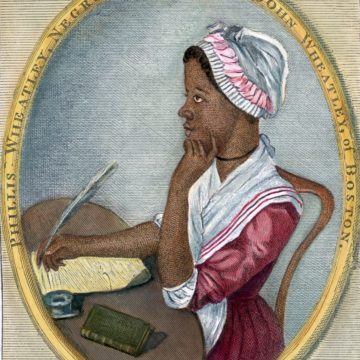Tara A. Bynum at The Hedgehog Review:
 I told a colleague once that Wheatley is funny. We were making small talk at a conference in a middling New England town, likely not too far from where Wheatley’s friend, Obour Tanner, settled for a time—while her hometown was occupied by British soldiers—in 1778 and 1779. I saw my colleague’s surprise. I told her about Thornton’s absurd request and Wheatley’s joke. With a bit of concern, she asked me, “How do you know that it’s funny? How do you know Wheatley is joking? Maybe she’s articulating a kind of anxiety.” Because I didn’t have Thornton’s letter handy and couldn’t show her Wheatley’s “Now to be Serious,” I responded with my own questions: “Since when are anxiety and humor mutually exclusive? Aren’t some of the funniest people anxious?” We were left at an impasse. She was left with the implausibility of a funny Wheatley, and I was left with a nagging question: Why can’t we imagine that a twenty-one-year-old woman would tell jokes? The answer, I now suspect, is that it’s in part because of our dependency on Wheatley’s poetry. Her poems offer readers what they know to expect—references to Africa, enslavement, or even complicity and complacency, and at times, resistance. Her letters don’t. They aren’t extraordinary or unique. They don’t recount an escape, and they don’t always tell a compelling story. They do share in very quotidian ways what might annoy her, what she might love, and what makes her laugh.
I told a colleague once that Wheatley is funny. We were making small talk at a conference in a middling New England town, likely not too far from where Wheatley’s friend, Obour Tanner, settled for a time—while her hometown was occupied by British soldiers—in 1778 and 1779. I saw my colleague’s surprise. I told her about Thornton’s absurd request and Wheatley’s joke. With a bit of concern, she asked me, “How do you know that it’s funny? How do you know Wheatley is joking? Maybe she’s articulating a kind of anxiety.” Because I didn’t have Thornton’s letter handy and couldn’t show her Wheatley’s “Now to be Serious,” I responded with my own questions: “Since when are anxiety and humor mutually exclusive? Aren’t some of the funniest people anxious?” We were left at an impasse. She was left with the implausibility of a funny Wheatley, and I was left with a nagging question: Why can’t we imagine that a twenty-one-year-old woman would tell jokes? The answer, I now suspect, is that it’s in part because of our dependency on Wheatley’s poetry. Her poems offer readers what they know to expect—references to Africa, enslavement, or even complicity and complacency, and at times, resistance. Her letters don’t. They aren’t extraordinary or unique. They don’t recount an escape, and they don’t always tell a compelling story. They do share in very quotidian ways what might annoy her, what she might love, and what makes her laugh.
more here.
